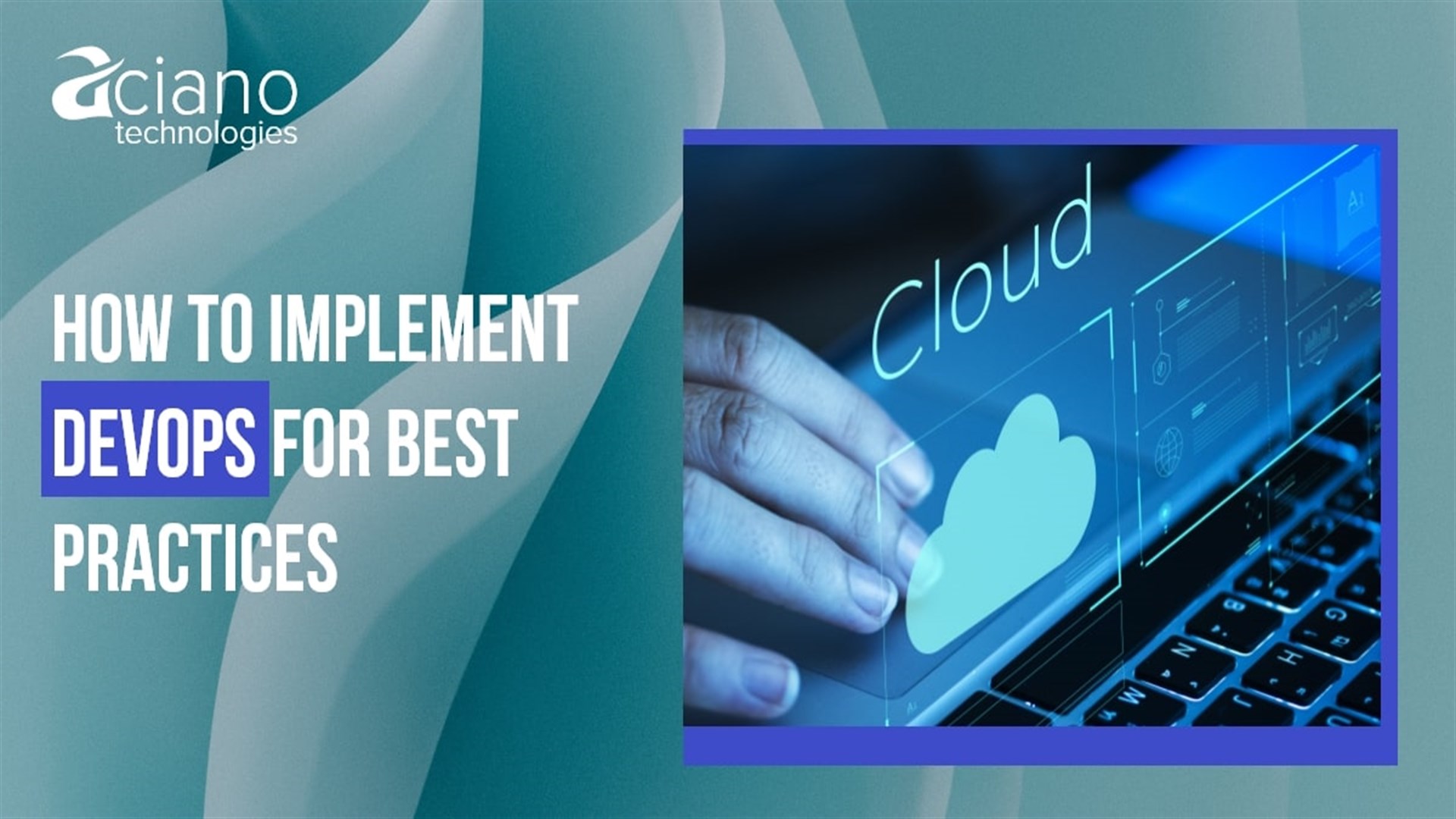There are many different combinations all around us that help us complete our daily duties more quickly and easily. Speaking from a technological point of view, some pairings are advantageous, while others are simply odd. In the technology world, DevOps is a very gifted combo, and many generations are happy about its discovery. Many companies hold the misconception that by using the DevOps methodology, they will achieve success and have everything under control. But we must admit that it is erroneous. To get the required results, there is a need for constant DevOps best practices.
What is DevOps?
.jpg) DevOps, a set of practices and tools that combines development and operations, refers to the practice of delivering applications and services more quickly than using conventional software development methods. It aims to break down the conventional divisions of labor between development and operations teams. A DevOps paradigm involves development and operations teams cooperating across the whole life cycle of a software program, from development and testing to deployment and operations. As a result of its speed, organizations are able to provide better customer service and engage in more profitable market competition.
DevOps, a set of practices and tools that combines development and operations, refers to the practice of delivering applications and services more quickly than using conventional software development methods. It aims to break down the conventional divisions of labor between development and operations teams. A DevOps paradigm involves development and operations teams cooperating across the whole life cycle of a software program, from development and testing to deployment and operations. As a result of its speed, organizations are able to provide better customer service and engage in more profitable market competition.
DevOps Platforms
DevOps platforms are integrated software suites. They provide a comprehensive set of tools and services for implementing DevOps practices across the entire software development lifecycle. Moreover, these platforms offer a centralized and standardized approach to DevOps, thus, making it easier for organizations to adopt and scale their DevOps initiatives.
Here are the most popular DevOps platforms:
Azure DevOps
 Azure DevOps is a set of services that offers a wide range of tools and capabilities for software development teams. It includes a code repository, continuous integration, and delivery (CI/CD) pipeline, testing and deployment tools, project management tools, and collaboration features. Azure DevOps supports a range of programming languages and platforms, and it integrates with a variety of other tools and services, including Visual Studio, GitHub, and Jira.
Azure DevOps is a set of services that offers a wide range of tools and capabilities for software development teams. It includes a code repository, continuous integration, and delivery (CI/CD) pipeline, testing and deployment tools, project management tools, and collaboration features. Azure DevOps supports a range of programming languages and platforms, and it integrates with a variety of other tools and services, including Visual Studio, GitHub, and Jira.
AWS DevOps
 AWS DevOps, on the other hand, is a set of services and tools that are designed specifically for cloud-based software development on the Amazon Web Services (AWS) platform. It includes services such as AWS CodeCommit, AWS CodePipeline, and AWS CodeDeploy, which provide code repositories, CI/CD pipelines, and deployment capabilities. AWS DevOps also includes tools for monitoring and logging, infrastructure as code, and collaboration.
AWS DevOps, on the other hand, is a set of services and tools that are designed specifically for cloud-based software development on the Amazon Web Services (AWS) platform. It includes services such as AWS CodeCommit, AWS CodePipeline, and AWS CodeDeploy, which provide code repositories, CI/CD pipelines, and deployment capabilities. AWS DevOps also includes tools for monitoring and logging, infrastructure as code, and collaboration.
Both Azure DevOps and AWS DevOps offer similar features and capabilities for implementing DevOps practices, but they differ in terms of their underlying cloud platforms and toolsets. Organizations may choose one or the other based on their specific needs and preferences, as well as their existing technology stack and infrastructure. Ultimately, the choice between Azure DevOps and AWS DevOps will depend on a variety of factors, including cost, ease of use, scalability, and integration with other tools and services.
DevOps Best Practices
Due to the immense benefits DevOps provides, companies are readily adapting to this cloud hosting service, and the providers are enjoying good revenues from it. However, there are some agencies whose AWS and Azure DevOps services pricing is still reasonable, and they provide worthwhile services.
After laying the groundwork, let's look at some DevOps best practices.
Cultivate Collaboration Culture
In order for this trip to be successful, we must first put a lot of effort into creating a culture where individuals can work together freely and without fear of failure. Groups and firms that value traits like empathy and trust are more likely to adapt to DevOps. Dismantle the barriers separating teams so they can collaborate to achieve a single objective and add value to the business. In turn, teams will take responsibility for a project from conception to completion. As a result of the team's increased attachment and investment, they can produce higher-quality work.
Adopt Continuous Integration and Delivery (CI/CD)
Developers need to integrate small batches of code into a single code repository to collaborate effectively. This method ensures the repository is always kept in good shape because we only make minor, manageable modifications. Each time, the automated builds and tests help to check small batches of code changes. Hence, continuous integration (CI) enables early error detection and enhances code quality.
Deploying our code into our environment comes next after integrating it. The practice of continuously putting the code into a deployable condition for each little batch of changes is known as continuous delivery (CD). It streamlines our deployment processes and gives our developers a simple, automated way to push code.
Set Up Automated Testing
Automating as much of the software development lifecycle as feasible is a crucial Azure and AWS DevOps practice. Programmers now have more free time to write code and develop new features. Automation is a vital part of a CI/CD pipeline since it reduces the likelihood of human error and increases team output. Plus, teams may achieve continuous improvement using automated processes and short iteration durations. It, in turn, enables them to react swiftly to client feedback.
Continuous Improvement
DevOps places a strong emphasis on prior approaches to software development, such as Lean and Agile. And it also emphasizes waste elimination and ongoing development. So, well-functioning DevOps teams continue to monitor performance data to identify areas that demand improvement. Whether it's automating repetitive operations like testing to save time or lowering the number of steps necessary to deliver new code, this constant improvement improves the efficiency of software systems and brings more customer value.
Follow the Proper Metrics
One DevOps best practice is continuous performance monitoring. The developers can only determine the usefulness of a DevOps approach by monitoring the appropriate performance measures. Such as team velocity, success factors, unit cost, pertinent profitability, overall involved cost, and other development team issues
Monitoring these indicators is essential since it enables you to identify problems early and take swift corrective action. However, the DevOps metrics you monitor will vary from business to business since they depend upon the objectives and standards of your firm.
Build Security
Security is a critical aspect of DevOps. It is essential to incorporate security measures throughout the software development life cycle to ensure that software is secure and compliant.
Developers can have a reliable security backup with DevOps. The CI/CD, pipeline, and security technologies work together seamlessly, and DevOps rules don't interfere with their agility or efficiency. Intellectual property is significantly safer on computers that utilize trusted and confirmed credentials. With various credentials, you can group them according to priority before adding a degree of security. In addition, if you want, you can create test scripts that include the access rights for each category.
Wrap Up
We have investigated many DevOps concepts and best practices and examined how we may apply them to improve team productivity and value creation. We hope that after reading this instructive essay about DevOps best practices, you can now make informed decisions about DevOps for your software development.
Partner with Aciano Technologies for Your DevOps Requirements
So, creating software that is lucrative and satisfies client needs is the aim of any software development team. However, cost is a crucial component of the development process. Because it affects both the number of features a team can support and the price at which these features are made available to customers.
Aciano Technologies is always here to help. We give your team the cost knowledge that enables you to control your cloud hosting costs and make wise choices regarding these kinds of trade-offs. Find out how our cost intelligence platform can support your DevOps-based software development efforts.



